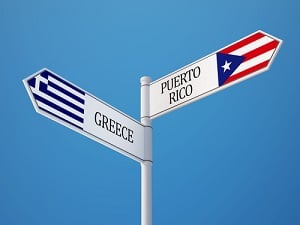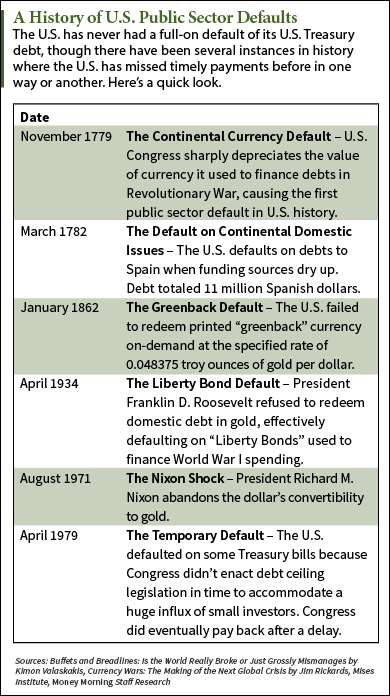 With news of both a Greek default and what was almost a Puerto Rican default, observers are predictably going to find a way to shift focus at some point - to the $18.2 trillion in U.S. debt.
With news of both a Greek default and what was almost a Puerto Rican default, observers are predictably going to find a way to shift focus at some point - to the $18.2 trillion in U.S. debt.
The big question here is: Could the U.S. go the way of Greece and Puerto Rico? Could the U.S. government default on its debt?
The simple answer is yes, the U.S. government can default on its debt, but not in the same manner as Greece or Puerto Rico.
You see, Greece and Puerto Rico both issue debt in currencies they themselves have no authority to print. Greece's debt is denominated in euros. Puerto Rico's debt is denominated in dollars.
That means they have to obtain those respective currencies to pay off both interest and principal on their debts. In the European Economic and Monetary Union, member states cede control of monetary policy to the European Central Bank. They are essentially using a foreign currency. Puerto Rico operates much like a U.S. state in that it uses the dollar and denominates debts in them but can't print them itself.
Let's look at Greece.
The Greek government, for example, can obtain euros by either exporting goods in exchange for them with other euro area countries or by issuing debt that has to later be repaid in euros.
As the euro-denominated debt grows, Greece can begin saving euros to pay down that debt. It can cut spending or raise taxes.
The moment that debt becomes unpayable, either because Greece doesn't have the productive capacity to support exports or it isn't generating enough revenue through taxes, Greece will default.
This is the same with Puerto Rico and the dollar.
The bottom line is that Puerto Rico and Greece need to have some savings to draw upon to pay back debts.
The U.S. is entirely different. This is because the U.S. debt is denominated in dollars, and the U.S. government is the sole issuer of the dollar. There is no question of solvency because the United States can simply "print" the money it needs to pay its debt.
So, what could happen to make the U.S. government default on its debt?
How the U.S. Government Could Default on Its Debt
 To be clear, the U.S. has defaulted on its debt in the past, though it was either tied to defaults on foreign currency debts, debts pegged to gold convertibility, or certain logistical issues that are no longer relevant to today's payment systems.
To be clear, the U.S. has defaulted on its debt in the past, though it was either tied to defaults on foreign currency debts, debts pegged to gold convertibility, or certain logistical issues that are no longer relevant to today's payment systems.
These are documented in the accompanying table.
The U.S. Treasury conducts all spending through a checking account at the U.S. Federal Reserve. The Fed is the U.S. government's banker.
Banks and foreign governments also have accounts at the Fed to facilitate the transfer of dollars. So, if the U.S. government wants to make a purchase of a radar system from a defense contractor, it will write a check and those funds will be moved from the U.S. Treasury account at the Fed to that contractors' bank account, which is held at the Fed in reserves.
Similarly, if the United States wanted to purchase goods from China, it would move the dollars into China's account at the Fed.
And how is this done? The United States is not drawing from savings it has built up through years of fiscal prudence. It's creating savings out of thin air. Those transfers will be made by debiting the U.S. government's account and crediting another through keystrokes on an electronic balance sheet.
The same goes for debt payments. The U.S. Treasury will simply move funds from one account to another electronically. The United States can do this indefinitely. It can't run out of electronic keystrokes.
The best way to look at the U.S. debt is as a savings account. If China, for example, exports goods and collects dollar payments, those dollar payments sit at China's account at the Fed. If China wants to earn interest on those deposits, it can instead move them over into a savings account - buying U.S. government debt - and earn interest that is paid for with those electronic keystrokes on a digital spreadsheet.
We know the U.S. Treasury has no trouble paying interest or rolling over the debt because it does so every day in large volumes without a problem. Few economists actually look at these publicly available documents, but daily U.S. Treasury statements show that for the current fiscal year (starting Oct. 1, 2014) until the end of June this year, the government has rolled over $50.1 trillion in debt.
The U.S. Treasury pointed out in an email to Money Morning that a majority of that number - $45.5 trillion - is government account series debt.
"These securities are for federal agencies that have specific statutory authority to invest in these special non-marketable Treasury securities," a representative from the U.S. Treasury wrote. "Agencies can invest in overnight securities that redeem and re-issue each day unless an agency decides not to reinvest."
Regardless, the ease with which this high volume is redeemed shows debt rollovers are standard practice at the Treasury and that the U.S. doesn't need to find new dollars to pay off debt; it already has an unlimited capacity to create them.
So the U.S. government doesn't need tax revenue to spend. It spends first by transferring funds as dictated by Congress through an electronic payments transfer system.
That's how it works. The U.S. has no spending constraint.
However, if the U.S. government spends beyond the economy's capacity to produce goods and services, then inflation kicks in, and the value of the dollar erodes. The only constraint is inflation, and that is managed by removing money from the private economy through higher taxes and less spending.
[epom key="ddec3ef33420ef7c9964a4695c349764" redirect="" sourceid="" imported="false"]
So, how could the U.S. government default on its debt then? Only if it chooses to.
Every so often Congress will debate raising the so-called "debt ceiling," a statutory limit to the amount of debt the United States can issue. If Congress votes not to raise it and ceases making what have always been seamless electronic debt repayments either on interest or maturity, then the United States would default.
But choosing to default is vastly different from not having the money to pay debts and defaulting in a manner Greece or Puerto Rico would.
Jim Bach is an Associate Editor at Money Morning. You can follow him on Twitter @JimBach22.
The Real Reason Russia and China Are Dumping U.S. Debt: The dollar is a weapon, one that is backed by U.S. military might. That has been shown to be the case throughout U.S. military history with Iraq, Iran, Russia, and any other number of U.S. adversaries that the U.S. Treasury seeks to cripple by shutting them out of international markets and financing. But the U.S.'s financial foes aren't taking it anymore...


